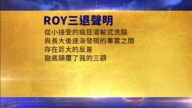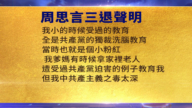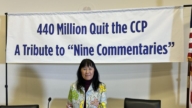【新唐人2011年4月9日讯】最近,有网友比较了海峡两岸“国民党”和“中国共产党”两党的入党誓词。真是不比不知道,一比吓一跳。我们现在就来看看到底有什么不同。
“国民党”的入党誓词有3大段,其中包含有4个“党”字,16个“国”字,13个“人”字,8个“民”字,除此以外,还有2个“仁”字,2个“道”字,3个“德”字。
而“中国共产党”入党誓词历经4次变化,但大同小异,都只有一小段,最新版的有12小句,其中有10个“党”字,1个“国”字,1个“人”字,1个“民”字。“人民”两字是1982年中共十二大时加上去的,放在“党”字的后面。“仁、道、德”这几个字却没有在入党誓词里出现。
《希望之声国际广播电台》评论员蓝述认为,“国民党”和“中国共产党”入党誓词有三点根本的区别。
蓝述(《希望之声》评论员):“一点,是国民党的入党誓词强调的是‘为民’,出发点是‘为民’的,中共的出发点是‘为党’的;第二点,(国民党)三民主义的基本理念是人道的理念,而共产党是共产主义的理念,是完完全全非人道的理念;第三点,国民党的入党誓词,它是中华民族传统和信天信神正统的思想,而共产主义的信仰是西方社会传来的非主流的,以撒旦教邪教为信仰的。”
在国民党入党誓词中,提到的“三民主义”指的是“民族主义”、“民权主义”和“民生主义”,是来源于美国总统林肯说的“government of the people, by the people, for the people”,就是民主、民权、民生。
但在“中国共产党”的入党誓词中,在短短的12句话里面,却有10句含有党字,并要“为党牺牲一切”。“人民”永远在“党”的后面。
蓝述(《希望之声》评论员):“中共口里讲的人民,是它所诠释的人民的党和人民,人民并没有投票权,人民并没有自由表达的权力,它讲的为党和人民,还是为党。在入党的第一天起,你就要首先放弃你的人道,你只要执行党的命令就行了。”
“中国和平民主联盟”主席唐柏桥认为,中共的入党誓词和黑社会的性质差不多。
唐柏桥(“中国和平民主联盟”主席):“黑社会社团一般宣誓的话,都有一个誓死效忠,不可以退出,退出后又什么惩罚。共产党的誓言,一旦宣誓后你一定要效忠它,然后不怕牺牲,还有就是共产党的利益,为共产主义事业奋斗终身等等。实际都是最强烈的一种对共产党的宣誓,然后永远不叛党等等,这词都是和黑社会的那种宣誓差不多少。”
唐柏桥认为,中东、北非地区国家虽然掀起了民主革命浪潮,但这些独裁执政党对异己的迫害还有法律程序、有媒体监督。但中国共产党,包括朝鲜的劳动党、古巴的共产党、前苏联的苏联党等,都是让异己从生理上消失,比法西斯还要残暴。
唐柏桥(“中国和平民主联盟”主席):“像文化大革命、三反、五反、包括现在对法轮功的镇压等等,那都是赤裸裸的大规模的消灭另外一个群体。”
从2004年11月起,《大纪元时报》推出的《九评共产党》一书,掀起了海内外退出共产党的热潮。延续到今天,目前已经有92,704,312 人宣布退出中共党、团、队。
另外,无独有偶,还有网友比较了美国警察“入警誓词”和中国大陆警察的“入警誓词”。中国大陆警察入警誓词中,警察首先要“保证忠于中国共产党”。而美国警察入警誓词中,首先说的是“我最基本的职责是为公民服务”。
新唐人记者刘惠、黎安安、孙宁采访报导。
======
Startling Comparison of the oath between CCP and Kuomintang
An interesting comparison has recently been made
By internet users about the difference between CCP
Oath and that of Kuomintang, the result came as a bit
Of a shock, let’s take a quick look at it.
The main text of Kuomintang’s oath comprised of
3 paragraphs, within which there are words of 4 Parties,
16 Nations, 13 People, 8 Citizens, plus there
are 2 Benevolence, 2 Justice and 3 Moralities.
The text of CCP, though revised 4 times, changed
Little. With only one small paragraph, the Oath was
given out in 12 sentences, where there are 10 Parties,
1 Nation, 1 People, 1 Citizen. The Characters
Of People and Citizen were only added after
The 12th National People’s Congress, coming in after
The Party. Words such as Benevolence, Justice and
Moralities are thoroughly absent.
The commentator of Sound of Hope Radio Lan Shu
Suggested that there were 3 fundamental differences.
Lan Shu: First, the oath of Kuomintang
Is based on the people’s interest, but CCPs based on
The interest of the party; second, Kuomintang has
Conveyed In its Three People’s Principles
the philosophy of humanity, CCP however,
the philosophy of party; third, KMT’s Oath
is delivered with the traditional Chinese faith,
Whereas CCP, introduced from the non-classic of
western World, is in the belief of devil.
In the text of Kuomintang’s oath,
Three People’s Principles Has been mentioned
which means nationalism, Democratic and
Principle of Livelihood, interpreted
From Lincoln, the US present, about “government of
the people, by the people, for the people”.
In the text of CCP’s oath, however, 10 out of 12 sentences
Have got the Party in it, and the Absolute Sacrifice For
The Party. What’s obvious is that People should always
come after the Party.
Lan Shu: CCP has implied that by people,
it means people of the party, ordinary citizens however
Do not have the right to vote or to speak freely.
It’s ultimately in the interest of the party, though it
Claimed that is for people. From the first day
one joined The CCP, one had to give up his humanity,
only to Follow orders.
Tang Baiqiao , the president of League of Peace and
Democracy in China, suggested that the oath of CCP
Bore a striking resemblance to that of the gangland.
Tang Baiqiao: In criminal organizations,
there is often a swear of allegiance and once joined,
one can hardly withdraw, for punishment would come
afterwards. CCP called for a total allegiance from its
members, to abandon any fear of death. Also, its principle
requires one to devote a life long of commitment.
It’s nothing different from an evil vow, for which one
has ever made should then never betray, it’s just evil.
Tang also suggested that in those democratic revolutions
Taking place in the Middle East and North Africa,
The crackdown of rulers were mostly subjected to law
Procedures and media scrutiny. CCP however, as
Well as the Labor Party in Korea, the Communist Party
In Cuba and Soviet Union, was to extinguish the
Dissident by any means necessary, much more brutal
Than the fascist.
Tang Baiqiao: [Recording] Examples such as the Great
Cultural Revolution, the Three anti-campaign, Five
Anti-campaign and current repression on Fa lun gong,
Are just flagrantly crackdowns against the dissident
In large scales.
The Epoch Times has released a book of
Nine Comments On CCP in Dec 2004, resulting in a
wave of withdraw from CCP membership. So far there
has been 92,704,312 people quitting from CCP
organizations.
What’s more, in the comparison of police oath between
CCP and United State, the initial requirement for the
Former has been to be loyal to the CCP; the latter, the
Service to the citizens.
NTD reporters Liu Hui ,Li Anan and Sun Ning






























